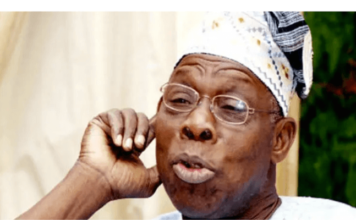Former President Olusegun Obasanjo stated that Nigerians are becoming poorer and the economy is suffering due to President Bola Tinubu’s poorly executed policies on fuel subsidy removal and foreign exchange rates. Obasanjo pointed out that the current administration has carried out three policies and programs that were either poorly conceived, poorly designed, or poorly implemented, harming both the citizens and the economy.
The former president criticized the sudden removal of the fuel subsidy, the poorly managed alignment of the parallel and official foreign exchange rates, and the sanctions imposed on Niger Republic by ECOWAS, influenced by Nigeria, as poorly implemented government policies. Speaking at a colloquium in Abuja titled “Nigeria’s Development: Navigating the Way Out of the Current Economic Crisis and While citing the example of TotalEnergies deal worth $6 billion investment which Nigeria lost to Angola, Obasanjo said Tinubu Presidency had not found the right way to handle the economy to engender confidence and trust for investors to start trooping in, and must quickly do something on economic incentives that are capable of attracting foreign investors, rebuilding the economy and bringing succour to the impoverished Nigerians.
He said, “The government has recently made three key decisions. Two of these—removing the subsidy and closing the gap between black market and official exchange rates—were necessary but poorly executed, causing economic hardship for Nigerians. The third decision involves addressing the military coup in Niger Republic.
The path forward is through production and productivity, which will foster belief and trust in government leadership. Economic progress requires hard work and cannot be achieved through shortcuts or orders, not even military ones. If we get it right, we could see positive changes in two years.
To gain the confidence and trust of investors, our leaders must change their approach and attitude. For example, Total Energy chose to invest $6 billion in Angola instead of Nigeria. The current administration has yet to find the right way to handle the economy to attract investors.” They understand us better than we understand ourselves. Currently, they are mocking us and not taking us seriously. We must present ourselves in a way that commands respect. If current investors are leaving our country, how can we attract new ones? We can be taken seriously if we choose to. However, we must shift from transactional leadership in government to transformational and genuine servant leadership.
With these changes, investors will give us the benefit of the doubt. If we ensure long-term security, they will begin to test the waters. With the right economic policies, integrity, and a clear purpose, we can progress with everyone working together, and the government serving as a catalyst for development and growth.” Thinkering with exchange rate is not the answer. The answer is consistency and continuity in policy to ensure stability and
predictability. That way, we will be sure of
incentivizing domestic and foreign investment. There must be honesty and transparency in government dealings and contracts and not lying with deception about these issues. When government is seen as pursuing the right policy, the private sector will go for production and productivity.
Change is possible but it must begin with the leadership.
Considering the theme of today’s event, the critical question is: How can we navigate our way out of these crises and towards a more secure and prosperous Nigeria? Addressing this requires a comprehensive approach that tackles the underlying causes of these challenges. We need to understand our past to know where we are coming from and how we arrived at our current situation. Our economy has long been plagued by ineffective policies, lack of sustainable long-term strategies, discontinuity, ad-hoc decision-making, and corruption fueled by personal greed, incompetence, lack of knowledge, understanding, and patriotism.”
A 25-year socio-economic development plan should be agreed upon by all political parties and enacted into law by the National Assembly, with corresponding aspects passed by State Houses of Assembly. This plan would be implemented in five-year intervals, resembling a constitution in its impact. The first priority of this plan should be to ensure education for all. Secondly, there should be a focus on achieving food and nutrition security through agribusiness. Thirdly, access to energy for all should be ensured. The fourth priority should be promoting industrialization and manufacturing. Lastly, emphasis should be placed on science, technology, innovation, and Artificial Intelligence (AI).
In all these areas, the government should create a conducive environment for the private sector to operate and thrive. Where the government is involved, it should be in the form of public-private partnerships, with the government as a junior partner.
“A ‘stick and carrot’ approach should be adopted, with stringent measures for those involved in criminal activities, and rehabilitation for those who can be reformed. It should be compulsory for all Nigerians to attend school for a minimum of eleven years, up to the secondary education level.”
